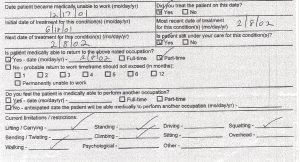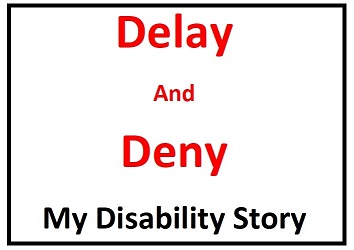My disability claims experience summary, Learning insurance company tactics such as delay and deny, 20/20 hindsight, Wolves in sheep’s clothing
Since my disability case is apparently about to go into litigation, I will refrain from mentioning specifics.
I had a great career in Business, IT and real estate.
I had customers from $ 5 million in sales to over a $ Billion and dealt with personnel from the top people all the way to the bottom.
I learned much.
There were many good hard working, conscientious folks at all levels.
I also witnessed incompetence and many cases of the left hand not talking to the right hand.
I have witnessed incompetence and communications issues in my dealings with my disability insurance company. As well as a well designed strategy, common to the industry of delay and deny as well as other negative behaviours that run contrary to their advertising platitudes.
I had 2 claims experiences. From 2001 to 2004 and from 2009 to the present. After recent review and in much less pain than when I went through it, the first experience played a much bigger role in the second than I had previously believed.
Part 1 2001-2004.
In March of 2001, I was 52, in great shape and within 5 pounds of my high school graduation weight. I was running on a regular basis. I went for a run and my right knee went out. So much so that I had great difficulty walking back to my car.
I tried my usual, time tested tactics of my own physical therapy, to no avail.
The impaired ability to walk as well as the pain during the day and at night, affecting my sleep was affecting my ability to perform my regular occupation, business/computer consulting. My work involved much walking inside of offices as well as warehouses, which I had done much work in in recent years.
An appointment with my orthopedic specialist on June 18, 2001 and xrays revealed “significant tricompartmental degenerative changes.” The doctor subsequently reported “severe osteoarthritis with progressively increasing pain and lack of function.”
I was in a lot of pain.
Even though I had been paying on this disability policy for many years, it did not occur to me to file a claim. I was younger and I perceived this disability as being short term and well defined. It turned out to be a much bigger deal with a much bigger impact on my occupation. I also spent 5 days in the hospital and the surgeon said it was the worst knee that he had ever seen.
The local agent became aware and insisted multiple times that I should file a claim. Surgery was scheduled for December 17, 2001. I filed the claim on November 24, 2001. I answered the following question: Date medically unable to perform regular occupation/activities? “since 3/31/01”. That seemed like the right answer. Perhaps too early. But the date certainly was not 12/17/2001, the date of the surgery. You probably already know that from reading the above.
So why did the doctor keep putting down 12/17/2001?
The contract reads:
“which prevents a covered person from performing an occupation (defined below) for wage or profit”
“An occupation means the covered person’s regular occupation or employment during the first 24 months of total disability.”
Every place on a form where the doctor indicates a date of disability the form states: “Date patient became medically unable to work”
That does not match with the contract wording of “covered person’s regular occupation.”
In the correspondence with the company they continued the narrative of “unable to work.”
I had several conversations with the company and the doctor trying to get this corrected. It was very frustrating, especially with all the pain I was in and trying to take care of daily responsibilities.
A later response from the doctor is interesting.
“Even though you may have sustained injury in March of 2001, we have to provide a date of December 17 as the onset of disability as from our standpoint you were unable to work beginning that date.”
For Social Security Disability:
“renders you unable to work in any capacity. You must not be able to engage in any “substantial gainful activity””
That also does not match with the contract wording of “covered person’s regular occupation.”
As stated above, I reluctantly filed the claim initially. I never intended to make this a big battle to take on. It did however, become quite a few skirmishes and looking back, in less pain and with 20/20 hindsight, it was a big deal. It revealed their hand, their true intentions as well as the fact that they slandered and libeled me. I have proof.
I believe, after much reevaluation and review, that it played a role in my second experience. That their responses were biased. I had dared to question them.
I also discovered a caveat in the policy that could have paid me for working part time and another reason they tried to shorten the disability period to stay within the 3 months required before paying.
I continued to try to get the doctor to report the correct date and to get the company to comply with the contract.
Upon a recommendation from my Legal Shield attorneys, I filed a complaint with the NC Insurance Commission. The company responded with their same old pat answers. Clearly they believed they had to respond, i.e. that they were bound to comply with NC laws. This would prove to be important later.
Here is a smoking gun example from the Physicians Statement dated February 8, 2002.

Conclusion:
As indicated I did not anticipate the impact of my knee condition, surgery and pain to have the impact that it did. But it clearly did. In 2001 my IT consulting income dropped by 17 % from 2000. My 2002 income dropped by 74 % from 2000. I used the down time to study and research the nuts and bolts of websites and SEO (search engine optimization) which I used in my real estate investing business a few years later.
Why did I keep the policy?
In my mom’s words: “Don’t cut off your nose to spite your face.”
From a company letter dated November 15, 2002 when the agent left:
If another insurer approaches you.
“Changing insurers could mean paying start-up costs–money you might not get back.”
“Because premiums normally increase with age, changing insurers may cost you more money for the same coverage. A change in health status can have the same effect; it may even impact your eligibility for new products.”
Rest of story.
I obtained a NC real estate salesperson licenses in the late 90’s. Not to practice traditional real estate sales but more for the knowledge to use in real estate investing. In 2003 I obtained a broker license and then the highest level BIC, broker in charge. This gave me the ultimate power in transactions and the ability to receive money directly for commissions on my or other people’s sales. I had been transitioning from IT consulting to real estate investments. Hands on real estate investments. That meant much physical labor as well as mental work. I began working on multiple websites to get primarily buyer side commissions and referrals. Referrals would be a good way to receive income and do less physical work as I aged.
I owned 4 houses and began working with partners in Charlotte and then moved there. We owned numerous houses, primarily with the intent of holding and renting them. In addition to obtaining financing and buying properties, I did a great deal of manual labor including gutting some old houses and all forms of renovations. We fortunately disposed of many of those houses before the housing crisis around 2008. I worked with many real estate agents including assisting friends and associates with marketing. I functioned as a buyer’s agent as a sideline activity. Getting referrals through the internet increasingly became a focus which involved developing my own websites.
Part 1 2009-present.
On February 27, 2009, one month after I turned 60, I was upstairs alone when I felt numbness in my right foot and it began moving up the right side of my body. I tried to remain calm, laid down on the bed to try to relax. I was thinking stroke.
I called the lady in my life and on the way back she called her father, an MD. I was admitted to the emergency room with numbness in my right foot, leg and arm. I was tested for stroke, given a CAT scan, MRI, blood tests and other procedures. Stroke was ruled out. I was kept overnight and the numbness in the leg and arm gradually disappeared. Numbness was still detected in the foot. I was kept in bed.
The following day I was discharged. From the moment that I left, it was apparent that the numbness and pain in the right foot was still present. I quickly learned that I could not sit normally and that pain and numbness
were helped some by lying in bed and some by sitting and propping my leg up. My sleep as well as my ability to function during the day was impaired. I had difficulty sleeping.
I had several visits with the attending physician, an internal medicine specialist. He finally referred me to a podiatrist who immediately referred me to a spine specialist. The spine specialists ran numerous tests and found compression and fusion in my lower tests. They ran point to point tests from my spine to my foot and stated that I had a atypical neuropathy. Though not as painful as then, it remains with me today and affects my sleep.
In the late 70’s I had major surgery on my right ankle and as described above, a total knee replacement on my right knee in 2001.
Claims were filed with the disability insurance company twice in 2009. Both times the spine specialist indicated “no work.” The responses from the company were surreal, so bizarre it was like interacting with characters in “Alice in Wonderland.”
After the second denial, my Legal Shield attorney wrote what I still believe was an excellent letter to the company. It didn’t matter. Delay and deny, lies, diversions, obfuscations.
Why didn’t I employ an attorney to help?
Initially I did not believe that I needed one. The case was so plain to see. I had jumped through enough hoops, given reasonable responses to their questions.
With 20/20 hindsight, more knowledge and research I now know that an attorney is essential.
Also, the contract dictated:
“(c) Procedures. No lawsuits or any other actions may be brought for any claims or disputes covered by this section. The following are the steps and procedure for presenting and resolving disputes:
• Step 1. Appeal. Appeal of the dispute to a designated reviewer within the Society as appropriate to the dispute.
• Step 2. Mediation. If Step 1 does not result in a mutually satisfactory resolution, either party has the right to have the matter mediated in accordance with the applicable mediation rules of the American Arbitration Association (or the rules of another neutral organization as agreed upon by the parties). The mediation shall be administered by a neutral organization agreed upon by the parties.
• Step 3. Arbitration. If Step 2 does not result in a mutually satisfactory resolution, the matter will be resolved by binding arbitration in accordance with the applicable arbitration rules as prescribed by the American Arbitration Association (or the rules of another neutral organization mutually agreed upon) as applicable to the type of matter in dispute. The arbitration shall be administered by a neutral organization agreed upon by the parties. The decision of the arbitrator shall be final and binding, subject only to the right to appeal such decision as provided in the arbitration rules and applicable laws. The member, insured, certificate owner or beneficiary shall have the right to be represented by legal counsel of his or her choosing at any time at his or her own expense (unless, as provided in Section 11(f) below, he or she is awarded attorneys fees). If an issue in dispute is subject to law that prohibits parties from agreeing to submit future disputes to binding arbitration, arbitration results shall be non-binding, unless the parties agree to binding arbitration after the claim or dispute has arisen. The Society will take reasonable measures to assure that the dispute resolution process proceeds promptly.”
This language implies that an attorney cannot be involved initially.
An attorney could have clarified that for me.
Not consulting with an attorney immediately was a big mistake!
In my defense, as I stated, I believed the claim was straightforward. I could not imagine it being denied even once. I was probably not at my best mentally. I was in a lot of physical and emotional pain. I was trying to survive day to day. This was uncharted territory for me being that age and not knowing the future.
I vowed that I was not going to roll over and die.
I later asked for my money back due to breach of contract.
Let me next say that I am one of the lucky ones.
I had liquid and other assets which I have relied on to this day and I had a support system of family and friends.
Since I could not rely on the disability insurance company, I had to make decisions quick. I was able to continue making payments on my best investment house which I eventually moved back into. My other great investment house was disposed of and another that I had been in the process of selling/renting went into foreclosure since I was not able physically and otherwise to handle it. I made my car payments. I did however drop insurance policies except for the disability policy which they kept reminding me to pay.
After many months my own physical therapy began to help some. Exercise generates endorphins, natural pain killers. My pain/numbness level today is probably half of what it was in 2009.
However, just as my disability pain was improving, my left knee was increasingly more painful and was replaced.
A year later, with severe pain in my shoulder area, I had surgery on my left shoulder.
It has been a struggle.
One can only live on assets for so long. So I took Social Security benefits early at age 62 1/2. This has reduced my benefits by approx. 25 % forever and will end up costing me over a hundred thousand dollars over my anticipated lifetime.
This experience has cost me hundreds of thousands of dollars in assets as well as physical and emotional pain.
In the midst of these challenges, I appealed their decisions and applied for a mediation session. At about that juncture I got a referral to a law firm that represents me to this day.
The mediation session, was a joke, a travesty of justice. I will elaborate on that later. My attorney did get the appeal process opened back up. That was a year ago. The company, even with the attorney, has continued their strategy of delay and deny, lies and obfuscations as well as what appears to be incompetency.
Five weeks ago to the day, my attorney stated she is filing a lawsuit. I am still waiting to see it.



